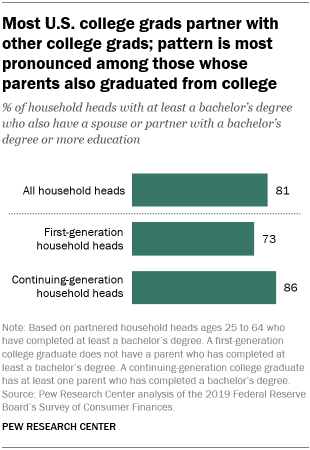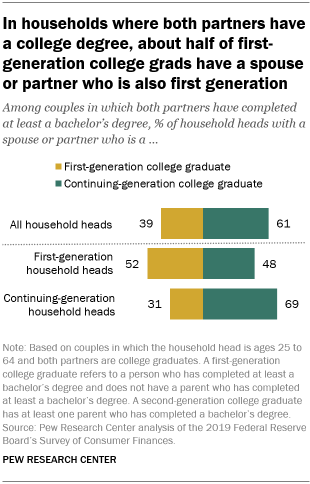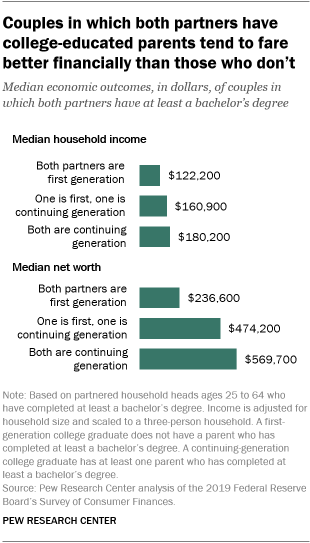It’s well established that college graduates in the United States tend to partner with other college graduates. In 2019, 81% of household heads with a bachelor’s degree or more education had a spouse or partner who was also a college graduate.

A new Pew Research Center analysis of government data shows that this pattern is even more pronounced for adults whose parents also graduated from college. Some 86% of household heads with a four-year college degree – and at least one parent with a degree – have a spouse or partner who is also a college graduate. By comparison, the same is true for a smaller share of household heads who are first-generation college graduates (73%).
When first-generation college graduates do partner with another college graduate, it is more likely that their partner will also be a first-generation graduate. Among couples in which both partners have a bachelor’s degree or more education, 52% of first-generation college graduates who are the household head have a spouse or partner who is also a first-generation graduate. This compares with only 31% among “continuing-generation” college graduates – those with at least one parent who graduated from college. Around seven-in-ten continuing-generation household heads (69%) instead are partnered with someone who, like them, has at least one parent with a college degree.

This Pew Research Center analysis of couples in the United States utilizes data from the 2019 Federal Reserve Board’s Survey of Consumer Finances (SCF). The SCF has been conducted triennially since 1983, and 2019 is the most recent available. Since 2016, the SCF has asked the household head about the highest level of education of the head’s parents. For couples, the highest level of education of the parents of the spouse or partner is also ascertained.
The SCF is designed to be representative of the nation’s households or “primary economic units.” This analysis is restricted to couples in which one member is the head of the household, ages 25 to 64, and has at least a bachelor’s degree. The full public use file for the 2019 SCF has about 5,800 households. This analysis is based on 1,301 couples.
The Center’s analysis follows conventional methods and examines household heads older than 24 because formal education is often not completed until age 25. Preliminary analysis revealed that first-generation college graduates tend to be significantly older than continuing-generation college graduates. Age is an important determinant of earnings and wealth and thus an upper limit of age 64 was imposed to reduce the age bias in comparing first- and continuing-generation college graduates. We also only included household heads where both of the parents’ education levels were known.
In the SCF, the head of the household is the male in an opposite-sex couple or the older person in a same-sex couple.
The median or typical household income figures presented are in 2019 dollars, adjusted for the size of the household and scaled to reflect a three-person household.
These patterns may partly reflect the differences in the types of colleges and universities that first- and continuing-generation college students attend. Among recent bachelor’s degree recipients, those whose parents have high levels of educational attainment are more likely to have graduated from a private, nonprofit four-year institution (rather than a public or for-profit institution), according to a recent survey by the National Center for Education Statistics.
The economic outcomes of college-educated couples show that partnering with a continuing-generation college graduate tends to boost the household’s economic fortunes. In 2019, the median household income of a couple in which both partners were first-generation college graduates was about $122,200. By comparison, in couples where both partners were continuing-generation college graduates, the median household income was about $180,200.

This is true in part because an individual’s earnings are connected not only with their own educational attainment, but also with their parents’, meaning that continuing-generation college graduates tend to have higher earnings, on average, than first-generation graduates.
Perhaps unsurprisingly, the net worth or wealth of college-educated couples also tends to be higher if the college graduates each have college-educated parents. The median net worth of two continuing-generation college graduates was about $569,700 in 2019, markedly outpacing the median wealth of two first-generation college graduates ($236,600). Couples with college-educated parents tend to have wealthier parents, and their parents likely give greater amounts of wealth to them.
The higher household incomes of couples including a continuing-generation college graduate partly reflect the higher educational attainment of these graduates. Continuing-generation college graduates are more likely than first-generation college graduates to complete an advanced degree, and adults with advanced degrees have higher earnings, on average. Recent research shows, however, that even after controlling for the attainment of advanced degrees, continuing-generation college graduates tend to earn more than first-generation college graduates.
